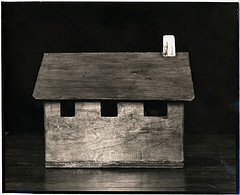
“Home” comes from the Proto-Germanic khaim, which differed from the meaning of “house” in those times as it does today. The khaim, or ham, as it traveled into Old English, meant a residence as opposed to simply a shelter. Its Proto-Indo-European root kei, meaning to lie down or settle, rendered this term more inviting and inclusive.
The word “domestic” has very old roots as well, stemming from the Greek domos, and later Latin domus, both meaning “house.” This word has the same origins as the verb “to dominate,” which originally meant to be the head of a household and, later, to be a despot or tyrant. To domesticate an animal — to tame it so that it can safely participate in the home — carries an interesting mix of the old and the modern sense, to dominate.
It’s appropriate to mention also, considering that two Americans were just awarded Nobel Prizes in Economics, that the terms “economics” and “economy” have their roots in ancient concepts of the home. Eco is a derivation of the Greek oikos, meaning an extended family unit that includes the home, land, slaves, and all animals and property. The oikos was run by the oldest male of the family, whose role it was to ensure that all components of the home were running smoothly. Thus, eco now designates a broad, self-sustained unit, as in the terms ecology, ecosystem, and economy, which still carries a bit of its original meaning: management of the home.
The parts of a house also have interesting word-origins. The word “ceiling”, for example, comes from the Latin celare, meaning to conceal, and plays off the word cælum, meaning “heaven” or “sky.”
The origins of the word “wall” are Old Germanic passed on from the Latin vallum, indicating a military rampart or partition. New York’s Wall Street got its name because it ran along the interior defensive wall of a Dutch colonial settlement.
The word “window” is a combination of “wind” and “eye.” It stems from the Old Norse vindauga (vindr meaning “wind” and auga meaning “eye”) and replaced the Old English eagþyrl, meaning “eye-hole.”
